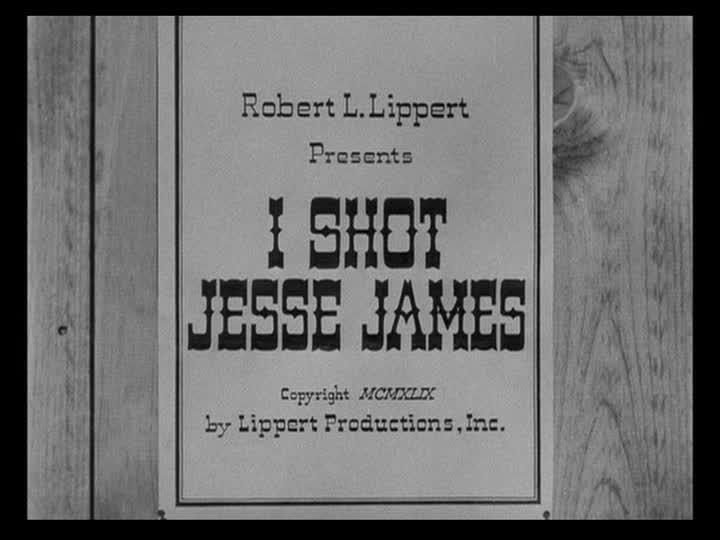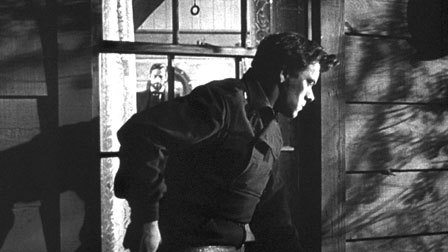Made for Lippert Pictures, a low rent production company specializing in B-Westerns and crime films for their even lower rent theater chain stretching across America’s Bible Belt, Sam Fuller’s first picture as a director carries all the darkness and doubt of films like McCabe and Mrs. Miller, Anthony Mann’s grubby string of 1950s Western Noirs, or Heaven’s Gate with Park Row and Pre-Code poetics (yeah, we know, 1948 ain’t pre-code by any stretch, but watching this next to I Am A Fugitive From A Chain Gang, Fuller’s 1948 feature sure feels like it). And if I Shot Jesse James can be considered the first revisionist western – an argument that makes more and more sense when one considers what a dramatic shift in sentiment it is to something like John Ford’s My Darling Clementine – than the Cine-Fist (as Godard would come to call Fuller) catapulted the genre out of its (perhaps) misdirected southern demographic like nothing else in the history of B-pictures.
The constraints of a low budget and a mere ten day shoot have something to do with it, but a great deal of credit should probably be extended to Lippert Productions for the claustrophobia and brutal tension than makes I Shot Jesse James so brilliantly unstable. In the late ’40s and early ’50s Lippert was producing grimy, naturalistic pictures like Little Big Horn (also starring John Ireland – Manny Farber called it the best film of 1951) and Three Desperate Men, and always the heroes were questionable, tragic figures. What Fuller added to this niche of stock footage-filled low budget filmmaking was poetry. Fuller’s pitch to Lippert, as he says in his autobiography (essential reading for anyone interested in pretty much any facet of American history or the smoking of cigars) was simply “It’s a murder movie, goddammit!” but there’s much more going on here.
Fuller’s west is far more claustrophobic than John Ford’s. In place of Henry Fonda leaning back in his chair next to the expanse of My Darling Clementine’s Arizona landscape is a very intense study of faces. Both Dave Kehr and Manny Farber would note that the more films Fuller made, the more he moved towards making films almost entirely out of close-ups. But here “close-ups” mean a great deal more than the physical space they take up on screen, and in fact there’s rarely a shot that doesn’t have someone’s torso in it. The way people look at each other in I Shot Jesse James (the expression on Ireland’s face when he shoots his best friend in the back, the way Barbara Britton looks at Ireland when she knows she doesn’t love him anymore because of it, the way Ireland looks at a kid who tried to kill him to because “the guy who shoots the man who shot Jesse James would be the best shot in the west”) makes the viewer conscious of every quality of their faces right down to their eyelash hairs. The way they look at each other and the way they appear individually on screen creates a balance between a very private world and a very naked, exposed one. Bob Ford’s life is humiliating, but he’s got a tough mug.
Following its run south of the Mason-Dixon Line and premiere in Los Angeles (Lippert also had a small movie palace in Fresno, where the whole outfit began), I Shot Jesse James should have been pegged for the B-movie graveyard (home of countless re-titles, re-issues, and re-distributions). But the economic and artistic success (which was and is considerable) of this murder movie is as a balancing act: it was a film whose success as a pulpy B-Western for the more conservative (presumably) mostly rural demographic of movie going Bible Belt carried over to the more liberal East and West Coasts as an art film (Godard said it had “an oppressive intensity the cinema had not seen since Dreyer’s Joan of Arc.”), and at the same time represented a shift in the language with which westerns were made, marking a transition between the traditional romantic westerns of John Ford and Howard Hawks, and the revisionist westerns of Budd Boetticher, Sam Peckinpah, and Anthony Mann. (JA)
The Northwest Chicago Film Society will run I SHOT JESSE JAMES on Wednesday, March 16th at the Portage Theater


